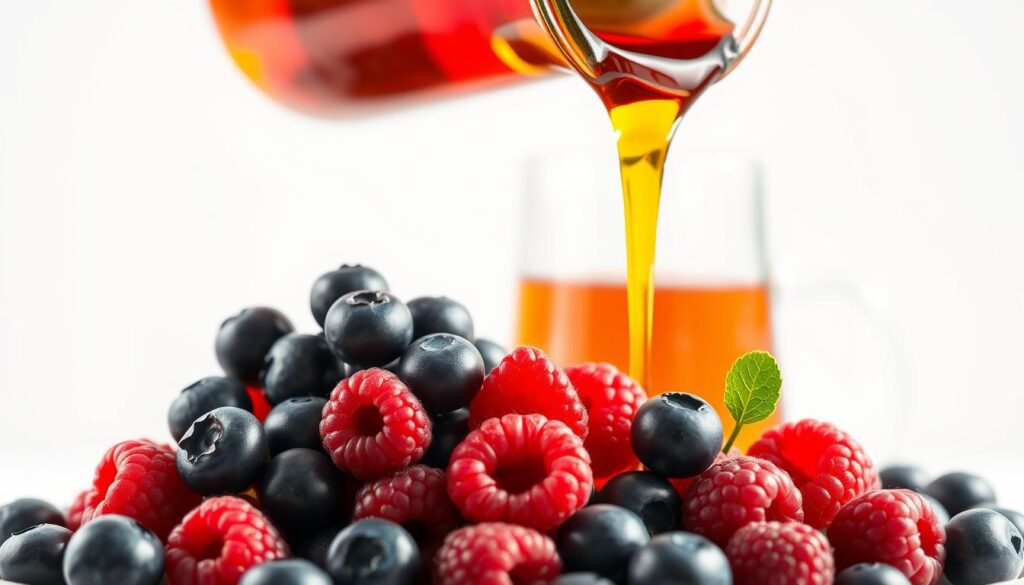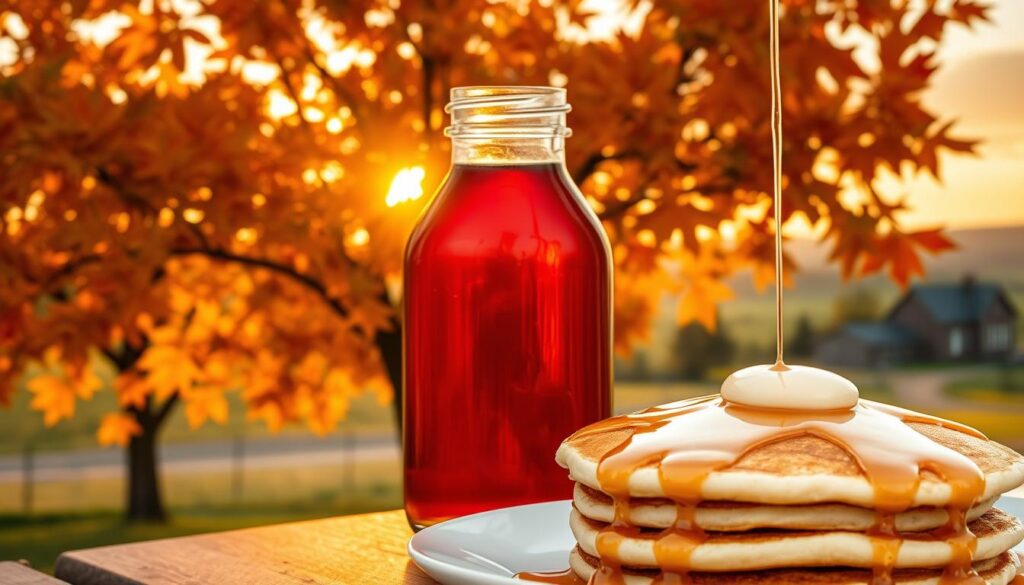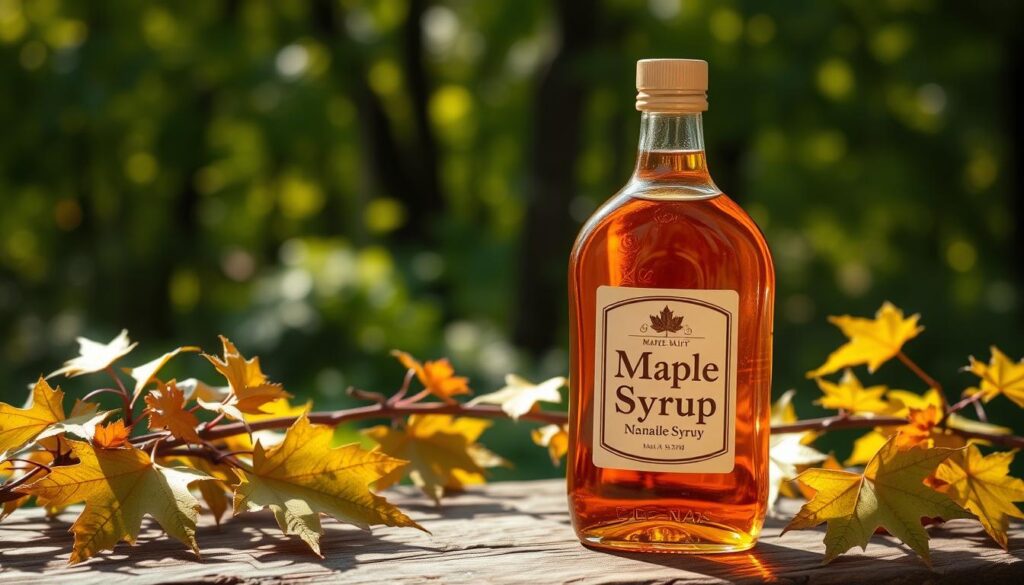In today’s health-focused world, people are looking for better sweeteners. Maple syrup is a top choice, known for its taste and health perks. It’s more than a breakfast staple; it’s a natural sweetener that can change how we eat.
More people are worried about the dangers of artificial sweeteners. They’re turning to natural options, with maple syrup at the forefront. Unlike fake sweeteners, maple syrup has nutrients, antioxidants, and a rich flavor that artificial sweeteners can’t offer.
Maple syrup’s journey from the forest to your table shows the value of traditional food making. Sugarmakers carefully tap maple trees to collect sap. This sap is boiled to make a sweetener full of nutrients, making maple syrup a better choice for health lovers.
Nutritionists and health experts often suggest maple syrup over artificial sweeteners. It has a lower glycemic index and contains minerals and antioxidants. This makes it a great choice for those wanting to eat better without losing flavor.
When looking at natural sweeteners, maple syrup is a standout. Its history, nutritional benefits, and unique taste make it a nutritional powerhouse. It’s not just a condiment; it’s a way to make your diet better.
Understanding Natural vs. Artificial Sweeteners
More people are looking for healthier sugar options. They want to move away from artificial sweeteners. The world of sweeteners is changing, with a focus on natural choices for better health.
Common Types of Artificial Sweeteners
Many synthetic sweeteners are found in stores. Here are a few:
- Aspartame
- Sucralose
- Saccharin
- Acesulfame potassium
The Rise of Natural Sweetener Alternatives
Natural sweeteners like maple syrup are becoming more popular. Health-conscious individuals are choosing unrefined sweeteners. They offer taste and possible health benefits.
Health Implications of Synthetic Sweeteners
Research shows possible risks with artificial sweeteners. They might affect how our bodies work and our gut health. This is why many are turning to natural sweeteners.
The shift towards natural sweeteners represents a broader movement in dietary awareness and holistic health approaches.
The Natural Origins of Pure Maple Syrup
Pure maple syrup comes from a long journey in North America. It starts with maple trees, like sugar maples, that hold lots of nutrients in their sap.
The way maple syrup is made is both old and green. Sugarmakers tap maple trees in late winter and early spring. This is called the maple sugaring season. They do this by:
- Choosing healthy, big maple trees
- Drilling small holes in the tree bark
- Putting in special spouts
- Collecting sap with buckets or tubes
Making organic maple syrup needs a lot of care for the environment. Sap flows best when it’s cold at night and warm during the day. This makes the sap flow out of the tree roots.
To turn sap into syrup, sugarmakers boil it down. They heat the sap until it’s thick with sugar. It takes about 40 gallons of sap to make just one gallon of syrup. This shows how special maple syrup is.
Every drop of maple syrup tells a story of natural craftsmanship and environmental harmony.
Nutritional Profile of Maple Syrup
Maple syrup is more than just sweet. It’s a Nutritious Sugar Alternative packed with nutrients. Unlike refined sugars, it offers a wealth of health benefits. Its mix of minerals, vitamins, and antioxidants makes it a great choice for a healthy diet.
Essential Minerals and Vitamins
Maple syrup is an Antioxidant-Rich Syrup with many nutrients. It has several important minerals:
- Manganese: Supports bone health and metabolism
- Zinc: Boosts immune system function
- Calcium: Promotes strong bones and teeth
- Potassium: Helps regulate heart function
Antioxidant Properties
Maple syrup’s antioxidants make it stand out. Scientific studies have found over 24 different antioxidant compounds. These help fight free radicals and support cell health.
“Maple syrup contains more beneficial compounds than many other natural sweeteners,” says nutritional expert Dr. Sarah Johnson.
Caloric Content Comparison
| Sweetener | Calories per Tablespoon | Nutritional Value |
|---|---|---|
| Maple Syrup | 52 | Rich in minerals and antioxidants |
| White Sugar | 49 | No additional nutritional benefits |
| Honey | 64 | Some trace minerals |
Maple syrup has calories, but it’s full of nutrients. It’s a better choice for a healthier sweetener. It offers not just calories, but also health-supporting compounds for overall wellness.
Maple Syrup Healthier Alternative to Artificial Sweeteners
Finding a natural sweetener that’s good for you can be tough today. Maple syrup stands out as a great choice. It’s a better option than artificial sweeteners, which can harm your health.
Maple syrup has many benefits:
- It comes from the sap of maple trees.
- It’s full of important minerals and nutrients.
- It has a lower glycemic index than refined sugars.
- It has antioxidants that are good for you.
Unlike artificial sweeteners, maple syrup is made from real ingredients. It has real nutritional value. It has minerals like zinc and manganese that help your immune system and metabolism.
Nutrition experts say maple syrup is a better choice for sugar substitutes. It’s unprocessed, so it’s closer to its natural state. This means you get a product without extra chemicals.
Maple syrup is more than just a sweetener. It’s a way to improve your nutrition and wellness.
Choosing maple syrup means picking a natural sweetener that’s good for you. It satisfies your sweet tooth while keeping you healthy.
Glycemic Index Benefits of Maple Syrup
Knowing about the glycemic index is key for keeping blood sugar stable. Pure maple syrup is a great choice for those looking for natural sweeteners. It’s better than refined sugars for health.
Pure maple syrup is a better way to sweeten food than regular sugar. Its glycemic index is between 54-65, which is much lower than many other sweeteners. This makes it good for people watching their blood sugar.
- Slower blood sugar absorption
- Reduced insulin spike
- Sustained energy release
- Natural mineral content
The special mix in pure maple syrup helps it have a low glycemic index. Studies show that maple syrup’s natural compounds help control how the body uses glucose. This leads to a slower energy boost compared to artificial sweeteners or refined sugars.
Maple syrup is a smarter choice for sweetening. It balances taste and nutrition.
Nutritionists say maple syrup is a good choice for a low glycemic index sweetener. It has a better metabolic effect and tastes richer than artificial sweeteners.
Antioxidant Properties and Disease Prevention

Pure maple syrup is a standout Antioxidant-Rich Syrup. It has strong health-protecting abilities. Its natural makeup fights off cell damage and boosts overall health.
Free Radical Protection
Pure Maple Syrup Benefits go beyond just being sweet. It’s full of antioxidants that fight off harmful free radicals. These free radicals can harm cells and lead to chronic diseases.
- Contains over 24 unique antioxidant compounds
- Provides stronger protection than many other natural sweeteners
- Reduces oxidative stress in human cells
Anti-inflammatory Benefits
Maple syrup has natural compounds that fight inflammation. These compounds can lower body-wide inflammation. This might help prevent many health issues.
- Helps lower inflammatory markers
- Supports cardiovascular health
- May reduce risk of chronic inflammatory diseases
Immune System Support
Maple syrup’s nutrient profile boosts immune function. Zinc and manganese in it are key for a strong immune system.
- Provides essential minerals for immune health
- Supports white blood cell production
- Enhances body’s natural defense mechanisms
Sustainable Production and Environmental Impact
Organic maple syrup is a great example of sustainable farming. It protects the environment and keeps traditional food making alive. The syrup is made with little processing and a lot of respect for forests.
Maple syrup production has many environmental benefits:
- It keeps mature forests safe
- It helps woodland areas stay diverse
- It needs very little industrial help
- It makes less carbon emissions than refined sugar
Sugarmakers manage forests well by tapping maple trees carefully. They make sure trees stay healthy and keep making sap for years. Their old ways let trees grow back and keep forests healthy, unlike many farming methods.
Choosing organic maple syrup means you’re helping the planet. It has a much smaller carbon footprint than fake sweeteners. Every gallon of syrup shows a good balance between farming and nature. It helps keep forests safe for future generations.
“Maple syrup production is a testament to sustainable agricultural practices that honor both nature and traditional food crafting.” – Forest Sustainability Research Institute
Sustainable maple syrup shows how old food ways can live with nature’s protection.
Culinary Applications and Versatility
Pure maple syrup is more than just a pancake topping. It’s a natural sweetener with amazing uses in cooking. Chefs and home cooks love its unique taste and versatility.

Maple syrup has a rich, complex flavor. It makes both sweet and savory dishes better. Unlike artificial sweeteners, it adds depth and pure maple syrup benefits.
Baking with Maple Syrup
Maple syrup changes baking in exciting ways. Here’s how to use it instead of sugar:
- Replace 1 cup of sugar with 3/4 cup of maple syrup
- Reduce liquid ingredients by 2-4 tablespoons
- Lower oven temperature by 25 degrees to prevent over-browning
Beverage Enhancement
Maple syrup makes drinks special. It’s great in craft cocktails and morning coffee. Its natural sweetness works well in both hot and cold drinks.
Savory Dish Applications
Maple syrup is also great in savory cooking. It adds complexity to marinades, glazes, and dressings. Chefs use it to balance and enhance protein and vegetable dishes.
| Culinary Category | Maple Syrup Application | Flavor Profile |
|---|---|---|
| Baking | Cookies, Cakes, Muffins | Rich, Caramel-like Sweetness |
| Beverages | Cocktails, Coffee, Smoothies | Smooth, Nuanced Sweetness |
| Savory Dishes | Glazes, Marinades, Dressings | Complex, Balanced Flavor |
Using maple syrup in different dishes lets home cooks and chefs enjoy its unique taste and health benefits.
Choosing and Storing Pure Maple Syrup
Choosing high-quality organic maple syrup is important. The right choice lets you enjoy the best benefits and taste. It makes your cooking and baking better.
When buying maple syrup, look for these things:
- 100% pure maple syrup with no added sugars
- Certified organic maple syrup from trusted producers
- Clear labels showing grade and where it’s from
- Little processing and natural making methods
Knowing about maple syrup grades helps you choose better. Each grade has its own taste and health benefits:
| Syrup Grade | Color | Flavor Intensity | Best Uses |
|---|---|---|---|
| Golden | Light | Mild | Pancakes, baking |
| Amber | Medium | Rich | Desserts, cooking |
| Dark | Deep | Strong | Marinades, glazes |
Keeping maple syrup in good shape is key. Keep unopened bottles in a cool, dark spot. Once opened, put it in the fridge. This keeps it fresh and its taste good.
Pure maple syrup can last up to a year if stored right. Always check for crystals or bad smells. These signs mean the syrup has gone bad.
Cost Comparison and Long-term Health Benefits

Choosing a nutritious sugar alternative is more than just looking at prices. Maple syrup might cost more at first, but its health benefits make it worth it for those who care about wellness.
Health experts say we should look at the big picture when comparing sweeteners. Maple syrup has many nutritional benefits that artificial sweeteners don’t:
- Rich in essential minerals like zinc and manganese
- Contains powerful antioxidants
- Lower glycemic index compared to refined sugars
- Natural production with minimal processing
Choosing a Nutritious Sugar Alternative like maple syrup can save you money in the long run. Artificial sweeteners have been linked to health problems, including metabolic issues and bad effects on gut bacteria.
Here’s a cost comparison for a year of sweetener use:
| Sweetener Type | Annual Cost | Potential Health Impact |
|---|---|---|
| Artificial Sweeteners | $50-$75 | Potential health risks |
| Pure Maple Syrup | $100-$150 | Nutritional benefits |
Maple syrup might be pricier, but its health benefits are huge. Investing in your health today can prevent costly medical expenses tomorrow. By choosing maple syrup, you’re making a smart choice for your long-term health.
Making the Switch: Transitioning from Artificial to Natural Sweeteners
Switching to natural sweeteners like maple syrup can change your health and cooking for the better. Unrefined sweeteners add a rich flavor that’s more than just sweet. They also offer health benefits that artificial sweeteners can’t.
Changing your sweetener takes time and planning. Your taste and cooking habits will adjust slowly to maple syrup’s unique taste.
Gradual Transition Tips
- Begin by using 25% less artificial sweetener and add maple syrup
- Slowly increase the maple syrup over weeks
- Try different maple syrup grades to find your favorite
- Listen to how your body and taste buds react
Measurement Conversions
Knowing how to measure unrefined sweeteners is key in recipes.
| Sugar/Sweetener | Maple Syrup Equivalent |
|---|---|
| 1 cup granulated sugar | 3/4 cup maple syrup |
| 1 tablespoon sugar | 3/4 tablespoon maple syrup |
| Artificial sweetener packet | 1 teaspoon maple syrup |
Recipe Adaptations
When using maple syrup in recipes, cut down on liquid by 1/4 cup for each cup of syrup. It adds moisture, so you might need to adjust the recipe’s consistency.
- Lower the oven temperature by 25 degrees when baking
- Add 1/4 teaspoon baking soda for better browning
- Expect changes in texture and color
Choosing natural sweeteners is more than a diet change. It’s a choice for healthier, tastier meals.
Conclusion
Maple syrup is a great choice for those looking for a healthier sweetener. It’s not just tasty but also good for you. It can help change the way we eat and improve our health.
Choosing maple syrup is more than picking a sweetener. It’s a choice for better health and sustainable eating. It has important minerals, antioxidants, and a unique flavor that artificial sweeteners can’t offer. Sugarmakers in North America have always known its value.
Now, people can cut down on artificial sweeteners and choose a better option. Maple syrup is great for baking, cooking, and drinks. Knowing its health and environmental benefits helps us make better choices for ourselves and the planet.
Maple syrup shows us that nature can give us healthy, tasty alternatives to processed foods. Choosing it is a step towards eating more mindfully and being healthier.



